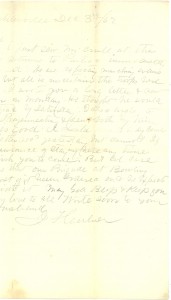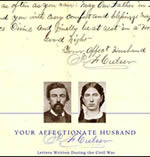 [google-map-v3 width=”400″ height=”300″ zoom=”12″ maptype=”hybrid” mapalign=”right” directionhint=”false” language=”default” poweredby=”false” maptypecontrol=”false” pancontrol=”false” zoomcontrol=”true” scalecontrol=”falso” streetviewcontrol=”false” scrollwheelcontrol=”false” addmarkermashupbubble=”false” addmarkerlist=”36.63234; -86.539994{}1-default.png” bubbleautopan=”true” showbike=”false” showtraffic=”false” showpanoramio=”false”]
[google-map-v3 width=”400″ height=”300″ zoom=”12″ maptype=”hybrid” mapalign=”right” directionhint=”false” language=”default” poweredby=”false” maptypecontrol=”false” pancontrol=”false” zoomcontrol=”true” scalecontrol=”falso” streetviewcontrol=”false” scrollwheelcontrol=”false” addmarkermashupbubble=”false” addmarkerlist=”36.63234; -86.539994{}1-default.png” bubbleautopan=”true” showbike=”false” showtraffic=”false” showpanoramio=”false”]
Mitchellsville – Dec. 3rd/62
Dear Wife
I just saw Mr. Crull at the Depot, who returns to Pontiac immediately being discharged.1 We are expecting marching orders for Nashville, but all is uncertain. The troops were [to] leave to-day.2
I wrote you a long letter & sent [it] by Mr. Reader on Monday. He thought he would get to Pontiac by Saturday. I also wrote to monthly S. S. Prayermeeting & sent both by him.
My health is good. I should like to say come as per your letter recd. yesterday but cannot. If we had any assurance of staying here any time, I should wish you to come. But Col. Case just tells me that our Brigade at Bowling Green has most of it been ordered on, & he expects we will go with it.3
May God Bless & keep you all. Give my love to all. Write soon to your affect. Husband.
J. F. Culver
- James L. Crull, a 37-year-old Fairbury farmer, was mustered into service as a private in Company E, 129th Illinois Infantry, on Sept. 8, 1862. Private Crull was medically discharged at Bowling Green, Nov. 25, 1862. Compiled Service Records of Union Soldiers, NA. [↩]
- With trains running between Mitchellville and Nashville, the supplies stockpiled at the former were forwarded to the army. General Rousseau accordingly alerted his brigade commanders to put their units in motion for Nashville. At the last minute, however, it was decided not to move Hambright’s brigade until more troops were brought down from Bowling Green to guard the railroad north and south of Mitchellville, because Colonel Morgan had sent raiders across the Cumberland attired in “citizens’ dress to loaf around and injure the railroad.” O. R., Ser. I, Vol. XX, pt. II, pp. 108, 116, 127. [↩]
- There was a dispute between General Rosecrans and Maj. Gen. Horatio G. Wright, the commander of the Department of the Ohio, over control of General Granger’s troops. As Wright was responsible for protecting the railroad between Louisville and the Tennessee line, he was unwilling for Rosecrans to pull the 38th Brigade out of Bowling Green, until he could replace it with one of his brigades. On the 2d, after much bickering, Wright finally agreed to release the 38th Brigade, but on the following day he changed his mind. Ibid., pp. 74, 76, 110, 116. [↩]

 Subscribe via RSS
Subscribe via RSS Subscribe via Email
Subscribe via Email